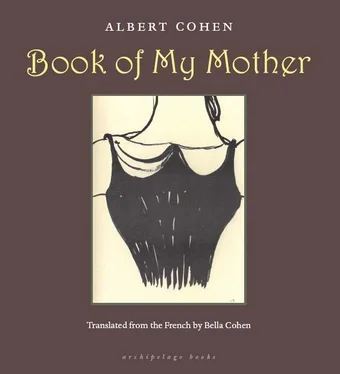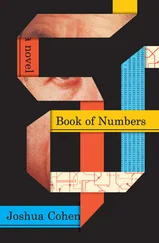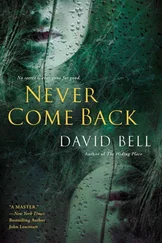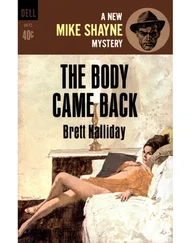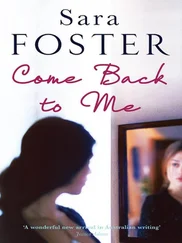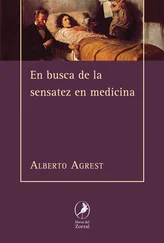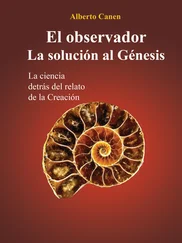Albert Cohen - Book of My Mother
Здесь есть возможность читать онлайн «Albert Cohen - Book of My Mother» весь текст электронной книги совершенно бесплатно (целиком полную версию без сокращений). В некоторых случаях можно слушать аудио, скачать через торрент в формате fb2 и присутствует краткое содержание. Год выпуска: 2012, Издательство: Archipelago Books, Жанр: Современная проза, на английском языке. Описание произведения, (предисловие) а так же отзывы посетителей доступны на портале библиотеки ЛибКат.
- Название:Book of My Mother
- Автор:
- Издательство:Archipelago Books
- Жанр:
- Год:2012
- ISBN:нет данных
- Рейтинг книги:5 / 5. Голосов: 1
-
Избранное:Добавить в избранное
- Отзывы:
-
Ваша оценка:
- 100
- 1
- 2
- 3
- 4
- 5
Book of My Mother: краткое содержание, описание и аннотация
Предлагаем к чтению аннотацию, описание, краткое содержание или предисловие (зависит от того, что написал сам автор книги «Book of My Mother»). Если вы не нашли необходимую информацию о книге — напишите в комментариях, мы постараемся отыскать её.
, which later grew into
. Achingly honest, intimate, moving, it is a tribute to all mothers.
Albert Cohen
Solal
Mangeclous
Belle du Seigneur
Les Valereux
Book of My Mother — читать онлайн бесплатно полную книгу (весь текст) целиком
Ниже представлен текст книги, разбитый по страницам. Система сохранения места последней прочитанной страницы, позволяет с удобством читать онлайн бесплатно книгу «Book of My Mother», без необходимости каждый раз заново искать на чём Вы остановились. Поставьте закладку, и сможете в любой момент перейти на страницу, на которой закончили чтение.
Интервал:
Закладка:
My mother’s incomparable love. My daughter loves me, but while I am writing here all alone she is having lunch with some pea-brained moron who is simply wild about art and beauty. (He pronounces it “bewtee.”) My daughter loves me, but she has her life and she leaves me all alone.
My mother was my talisman. All that she wanted was to sit by my side and sew. She would breathe in a little saliva as she sewed, and then we would look at each other and I would feel in my place, reassured, a son. Then she would get up and go into her lovely kitchen, which was the bridge of her ship, to perform her sacred little tasks, pat her meatballs, though they did not need it, and put frightful jagged-edged paper on the shelves. Then she would call me to come and admire the jagged-edged paper and she would look at me to see if I approved. It is such humble things which make up sublime love.
Some men must have passion and young huntresses with long thighs, or glamorous stars — who, by the way, blow their noses in handkerchiefs and do not produce pearls. That is their affair, and much good may it do them. Speaking for myself, my mother is all I want — especially Maman in her old age, with her white hair and her enthusiastic chatter about things I already knew by heart. What I want is my old mother, my mother with the false teeth which she wore during the last years of her life and which she used to wash under the tap. She was so sweet without her false teeth, so defenseless, innocent and harmless as a gummy babe, childlike, her pronunciation distorted, and with motherly coyness she would stifle her laughter and put her hand in front of the gap in her mouth. With her alone I was not alone. Now I am alone with everyone.
With those I love most dearly — friends, daughter, and loving women — I always have to pretend a little, conceal a little. With my mother I had only to be what I was, with my anguish, my failings, my afflictions of the body and the soul. She did not love me less. My mother’s incomparable love.
With her alone I could have lived far from the world. Never, like others, would she have thought, “He has stopped publishing books” or “He is getting old.” No. “My son,” she would have said trustingly to herself. And so, lifting up my eyes, which bear the noble mark of your goodness, and cutting through the immensity of space and silence, I reciprocate that act of faith, and I say to you gravely, “Maman.”
XIII
OH, HER TEARS at the station in Geneva on the evening she left for Marseilles, while the engine shrieked like a madwoman in despair, clanked and belched steam from under the axles! At the carriage door she gazed at me so tenderly, wild eyed and distraught, no longer worried about appearing smart and well dressed. She knew that she was leaving me for a whole year and that a gulf which now I hate separated my life from her own humble life. Oh, the tearful blessing of my mother at the carriage door, my mother looking at me so intently, my mother suddenly so old, beaten, her hair disheveled and her hat absurdly askew! Oh, the blessing of my mother, defenseless, discomfited, wretched, vanquished, an outcast, so dependent and lowly, a little crazy in her distress, a little unhinged by her distress! Over now, the wonder of being together, the pitiful festival of her life. Oh, her panic-stricken distress at the carriage door of the train, which was starting to move, which was about to bear her away toward her life of solitude, which was bearing her away, powerless and condemned, far from her son, while she blessed me and wept and stammered thanks! Strange that I did not take her tears seriously enough. Strange that only now do I realize that my mother was a human being, someone apart from myself, someone who truly suffered. Perhaps that very evening I would go to see my lover.
A son said to me, and it is he who speaks now, I too have lost my mother, said that son with dark-ringed eyes. I too lived far away from her and she would come and stay with me for a few weeks which for her as well were the meager enchantment of her life. I too, said that son, on the very evening of her departure, instead of weeping all night for my mother, who was incomparable, I would go, sad but soon consoled, to see one who was comparable, one of the exquisite she-devils of my life, whose name was Diane — Diane, priestess of love. I would go, giving scarcely a thought to my mother, whose head was nodding, dazed with grief, in the train which was bearing her away from me and where she was thinking only of her son — the son who at the very instant, thinking no more of his mother all alone and tiny in her train, was laughing aloud for love in the taxi which was taking him to his Diane. Oh, the sinful pleasure of saying that name! And I would take advantage of the noise of the engine to sing love songs at the top of my voice with no fear of the comments of the driver, to whom I planned to give a sparkling tip, so happy was I at last to be seeing Diane again.
While my mother was weeping and blowing her nose in her train, said that son whom I dislike, I was gazing joyfully at my youthful face in the taxi mirror, gazing at the lips which in just a few minutes Diane would so passionately kiss, and quivering with impatience I sang sickening songs of stupid passion and above all the luminous name of the blonde she-devil called Diane — Diane, slender and fervent and overintelligent, toward whom the taxi was speeding me, admirably shaved, admirably dressed, and taut with desire. And all at once here was the villa where dwelt the orphan Diane, the most beautiful and sumptuous of maidens, who stood waiting for me under the roses round the door, tall in her white linen dress sheathing the firm nudity which was offered to me alone. Diane, live and sunlit and devilishly jealous, poetic yet athletic, sensual yet idealistic and given to singing hymns on Sunday. Diane, nurtured on sunshine and on fruit, who would send me hundred-word love telegrams from her travels — yes, always telegrams, so that the beloved would know at once how dearly his loving loved one loved him incessantly. Diane who would phone me at three or four in the morning to ask if I still loved her and tell me that “I love you and love you like an imbecile and I hate myself for loving you so much, my beloved, and no Romanian peasant girl with long plaits ever looked at her man with such trusting adoration.”
On the night of my mother’s departure, said that son, Diane accompanied me home, and in the flat which my mother had blessed before leaving I dared to undress the impatient Diane. When our ardor was spent, and with countless kisses tattooed on our faces, we fell asleep in the fragrant bed at the foot of the precipice of joy and we had the same sated smile in our sleep while my old mother was blessing me and blowing her nose in the train which was bearing her far away from me. O shame! Sons and daughters, cursed breed!
Thus spoke that son. Like him perhaps, on the evening of my mother’s departure — the very evening when piteously she had stood at the carriage door and thanked me and blessed me with hands spread out like sunbeams, blessed me with all the fervor of her face glistening with slow tears — like him perhaps I would go, hurrying out of the station, go impatiently, son that I was, to see an adoring, fragrant, whirling and twirling lover, an Atalanta wreathed in sunlight. O cruelty of youth! It is right that I should suffer now. My suffering is my vengeance against myself. She expected so much of me, with her plump face, wholly loving, so naïve and childlike. My old Maman. And I gave her so little. Too late. Now the train has left forever, for the forever. Crushed, devastated, her hair disheveled, and ceaselessly blessing me, my dead mother is at the carriage door of the train of death. And I trail after the moving train, panting as I trail, ghastly pale, sweating and obsequious, in the wake of the moving train which is bearing away my dead mother and her blessings.
Читать дальшеИнтервал:
Закладка:
Похожие книги на «Book of My Mother»
Представляем Вашему вниманию похожие книги на «Book of My Mother» списком для выбора. Мы отобрали схожую по названию и смыслу литературу в надежде предоставить читателям больше вариантов отыскать новые, интересные, ещё непрочитанные произведения.
Обсуждение, отзывы о книге «Book of My Mother» и просто собственные мнения читателей. Оставьте ваши комментарии, напишите, что Вы думаете о произведении, его смысле или главных героях. Укажите что конкретно понравилось, а что нет, и почему Вы так считаете.
